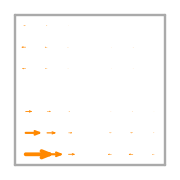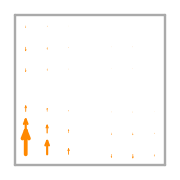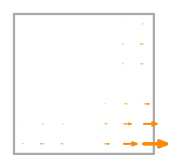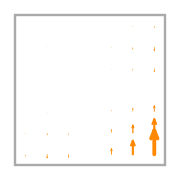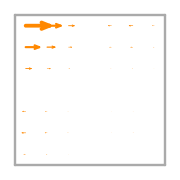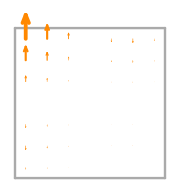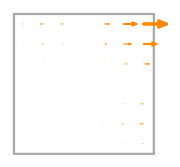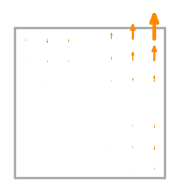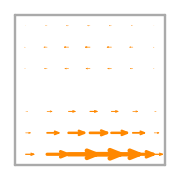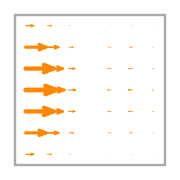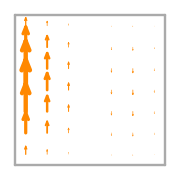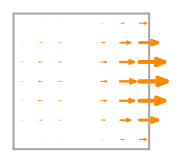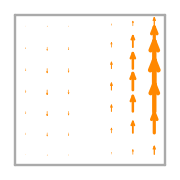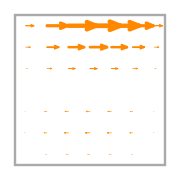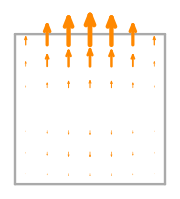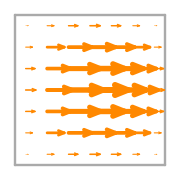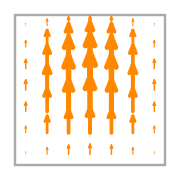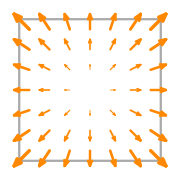an encyclopedia of finite element definitions
Degree 2 enriched vector Galerkin on a quadrilateral
◀ Back to enriched vector Galerkin definition page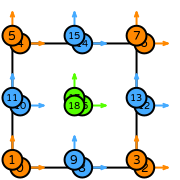
- \(R\) is the reference quadrilateral. The following numbering of the subentities of the reference is used:
- Basis functions:

\(\displaystyle \boldsymbol{\phi}_{0} = \left(\begin{array}{c}\displaystyle 4 x^{2} y^{2} - 6 x^{2} y + 2 x^{2} - 6 x y^{2} + 9 x y - 3 x + 2 y^{2} - 3 y + 1\\\displaystyle 0\end{array}\right)\)
\(\displaystyle \boldsymbol{\phi}_{1} = \left(\begin{array}{c}\displaystyle 0\\\displaystyle 4 x^{2} y^{2} - 6 x^{2} y + 2 x^{2} - 6 x y^{2} + 9 x y - 3 x + 2 y^{2} - 3 y + 1\end{array}\right)\)
\(\displaystyle \boldsymbol{\phi}_{2} = \left(\begin{array}{c}\displaystyle x \left(4 x y^{2} - 6 x y + 2 x - 2 y^{2} + 3 y - 1\right)\\\displaystyle 0\end{array}\right)\)
\(\displaystyle \boldsymbol{\phi}_{3} = \left(\begin{array}{c}\displaystyle 0\\\displaystyle x \left(4 x y^{2} - 6 x y + 2 x - 2 y^{2} + 3 y - 1\right)\end{array}\right)\)
\(\displaystyle \boldsymbol{\phi}_{4} = \left(\begin{array}{c}\displaystyle y \left(4 x^{2} y - 2 x^{2} - 6 x y + 3 x + 2 y - 1\right)\\\displaystyle 0\end{array}\right)\)
\(\displaystyle \boldsymbol{\phi}_{5} = \left(\begin{array}{c}\displaystyle 0\\\displaystyle y \left(4 x^{2} y - 2 x^{2} - 6 x y + 3 x + 2 y - 1\right)\end{array}\right)\)
\(\displaystyle \boldsymbol{\phi}_{6} = \left(\begin{array}{c}\displaystyle x y \left(4 x y - 2 x - 2 y + 1\right)\\\displaystyle 0\end{array}\right)\)
\(\displaystyle \boldsymbol{\phi}_{7} = \left(\begin{array}{c}\displaystyle 0\\\displaystyle x y \left(4 x y - 2 x - 2 y + 1\right)\end{array}\right)\)
\(\displaystyle \boldsymbol{\phi}_{8} = \left(\begin{array}{c}\displaystyle 4 x \left(- 2 x y^{2} + 3 x y - x + 2 y^{2} - 3 y + 1\right)\\\displaystyle 0\end{array}\right)\)
\(\displaystyle \boldsymbol{\phi}_{9} = \left(\begin{array}{c}\displaystyle 0\\\displaystyle 4 x \left(- 2 x y^{2} + 3 x y - x + 2 y^{2} - 3 y + 1\right)\end{array}\right)\)
\(\displaystyle \boldsymbol{\phi}_{10} = \left(\begin{array}{c}\displaystyle 4 y \left(- 2 x^{2} y + 2 x^{2} + 3 x y - 3 x - y + 1\right)\\\displaystyle 0\end{array}\right)\)
\(\displaystyle \boldsymbol{\phi}_{11} = \left(\begin{array}{c}\displaystyle 0\\\displaystyle 4 y \left(- 2 x^{2} y + 2 x^{2} + 3 x y - 3 x - y + 1\right)\end{array}\right)\)
\(\displaystyle \boldsymbol{\phi}_{12} = \left(\begin{array}{c}\displaystyle 4 x y \left(- 2 x y + 2 x + y - 1\right)\\\displaystyle 0\end{array}\right)\)
\(\displaystyle \boldsymbol{\phi}_{13} = \left(\begin{array}{c}\displaystyle 0\\\displaystyle 4 x y \left(- 2 x y + 2 x + y - 1\right)\end{array}\right)\)
\(\displaystyle \boldsymbol{\phi}_{14} = \left(\begin{array}{c}\displaystyle 4 x y \left(- 2 x y + x + 2 y - 1\right)\\\displaystyle 0\end{array}\right)\)
\(\displaystyle \boldsymbol{\phi}_{15} = \left(\begin{array}{c}\displaystyle 0\\\displaystyle 4 x y \left(- 2 x y + x + 2 y - 1\right)\end{array}\right)\)
\(\displaystyle \boldsymbol{\phi}_{16} = \left(\begin{array}{c}\displaystyle 16 x y \left(x y - x - y + 1\right)\\\displaystyle 0\end{array}\right)\)
\(\displaystyle \boldsymbol{\phi}_{17} = \left(\begin{array}{c}\displaystyle 0\\\displaystyle 16 x y \left(x y - x - y + 1\right)\end{array}\right)\)
